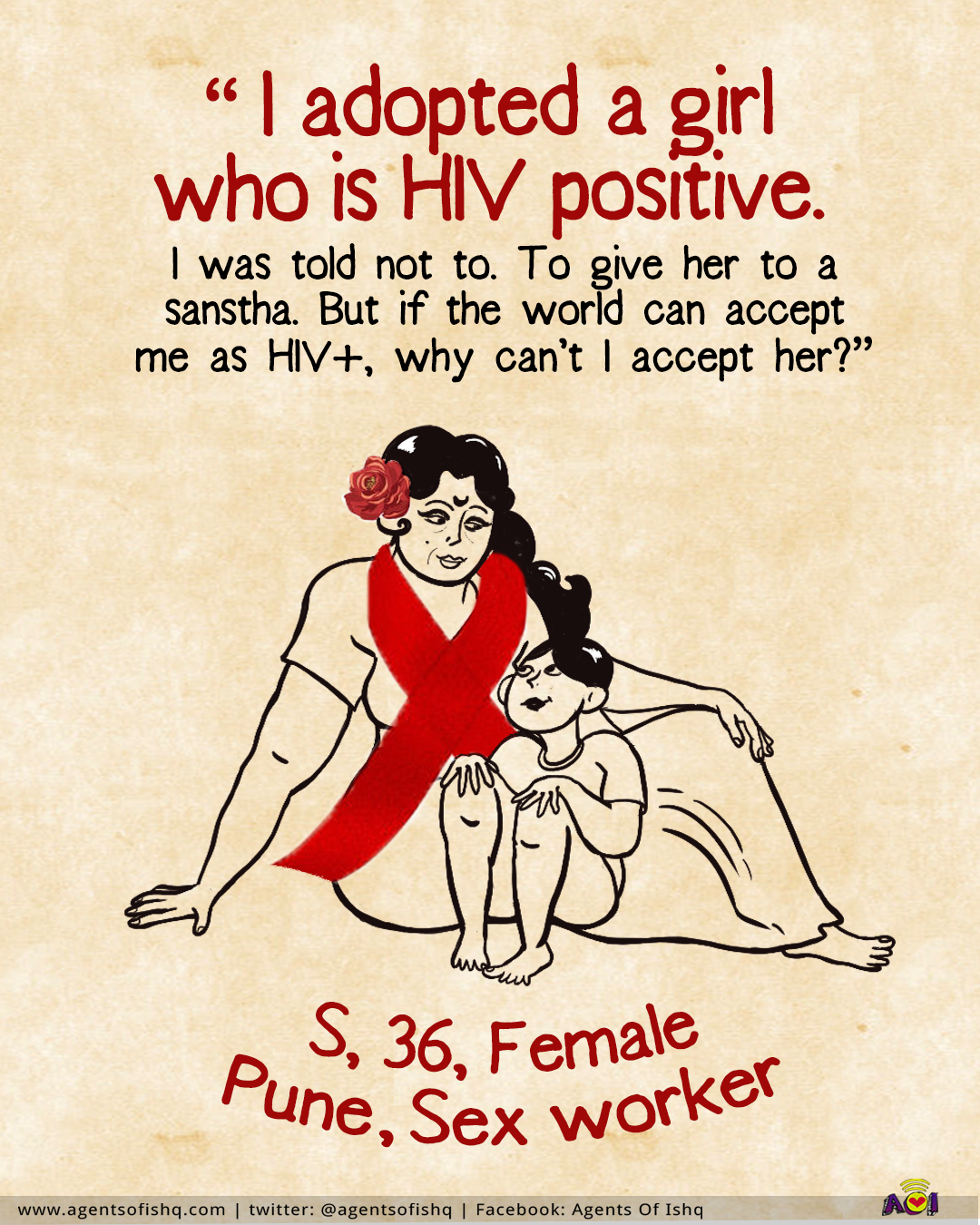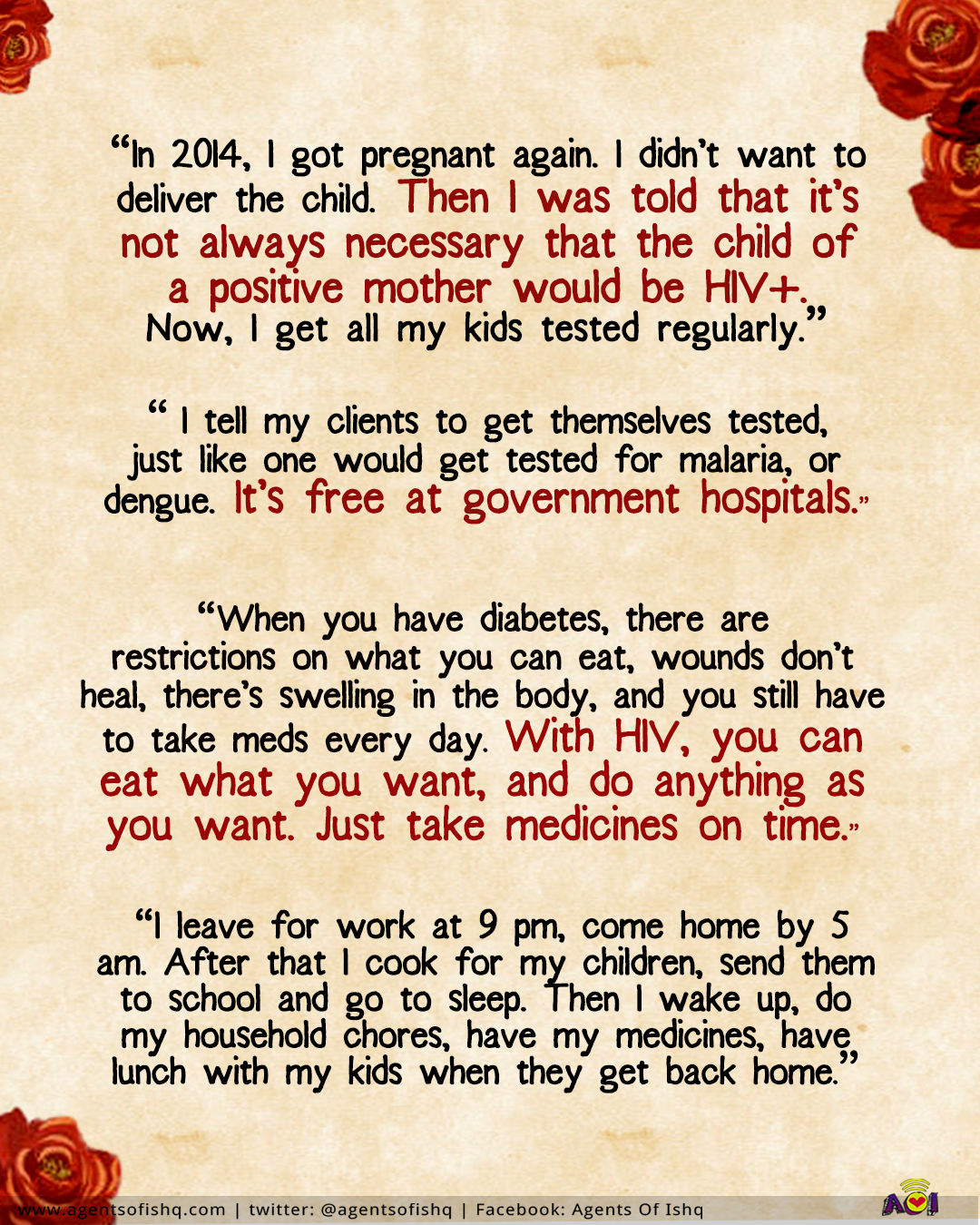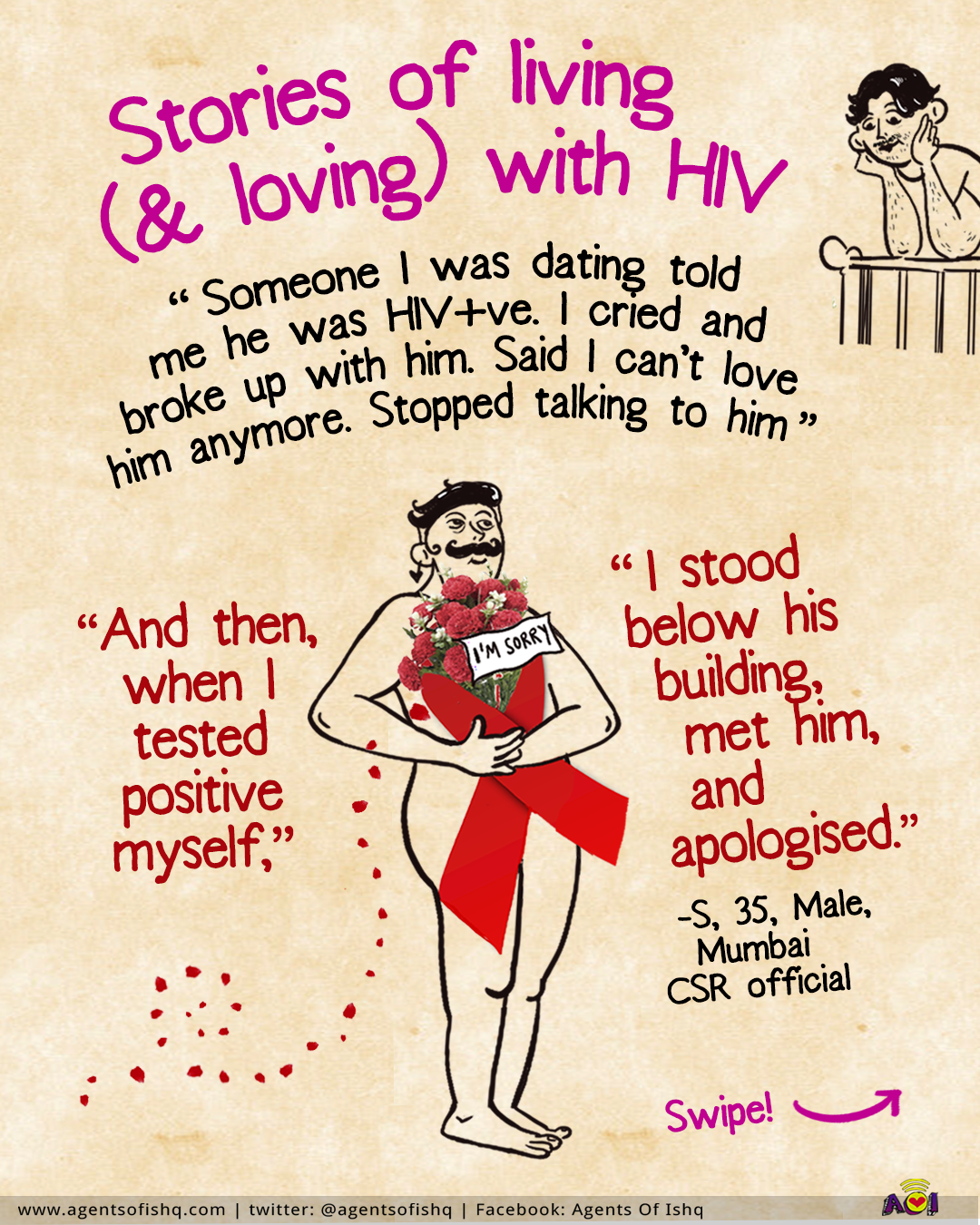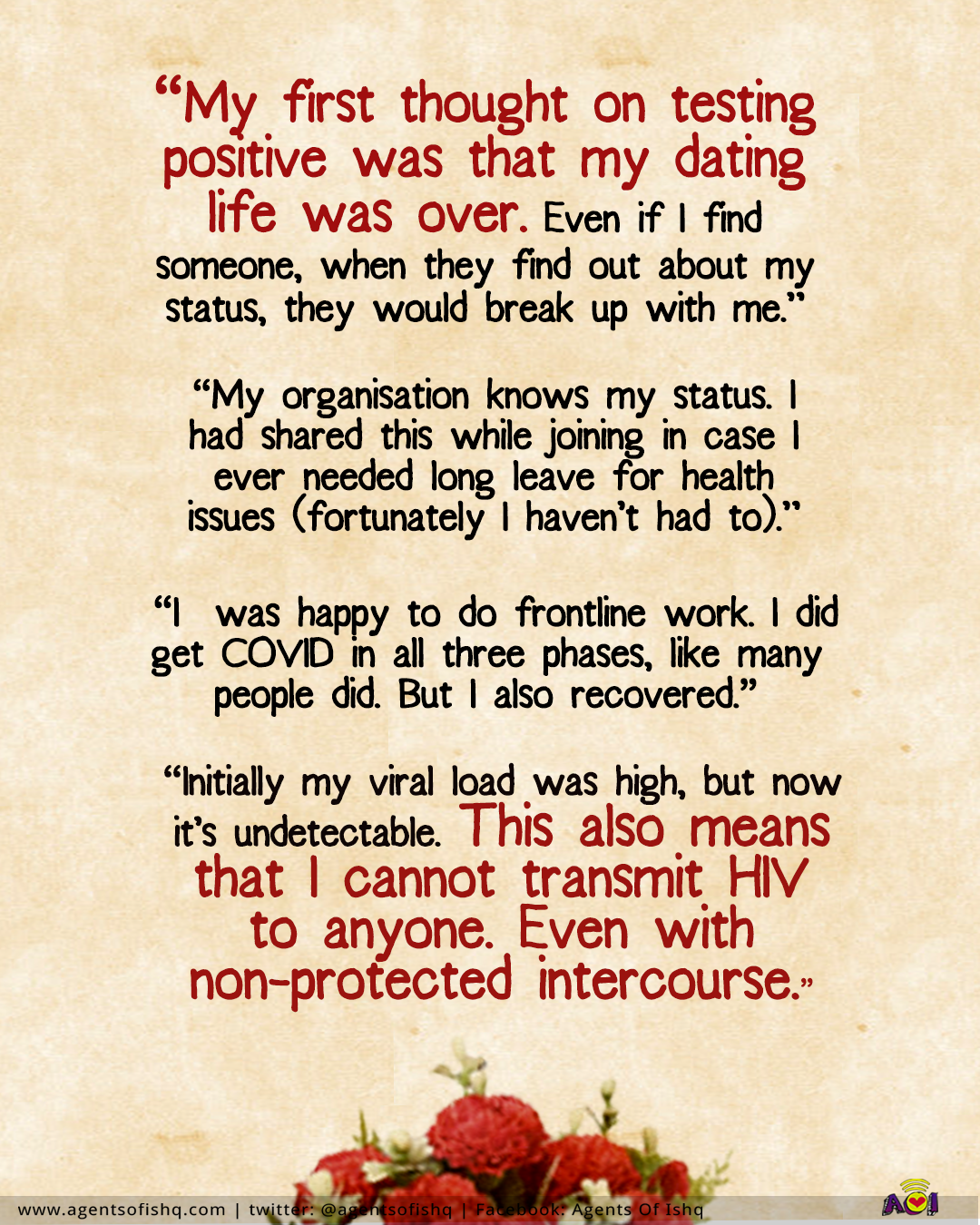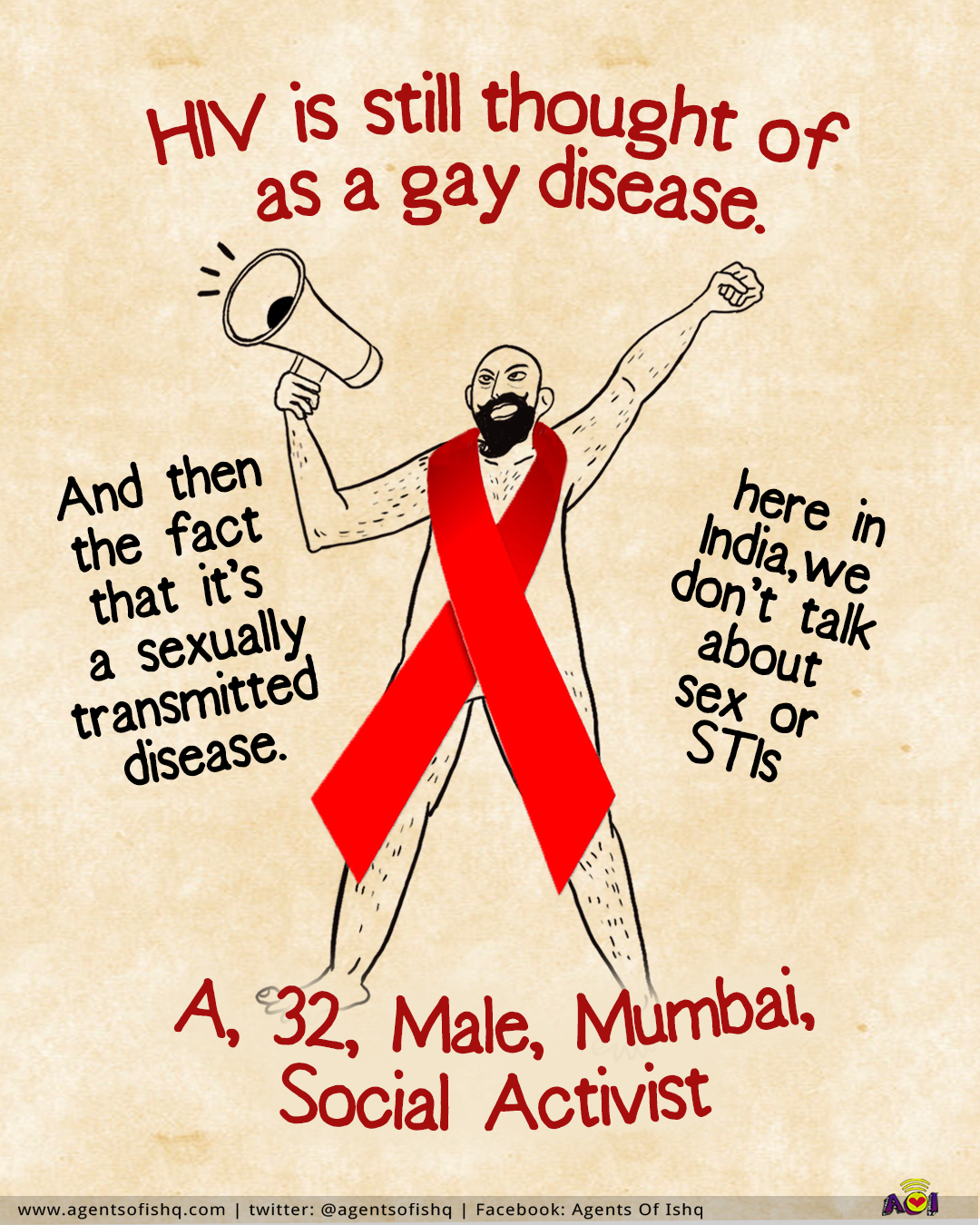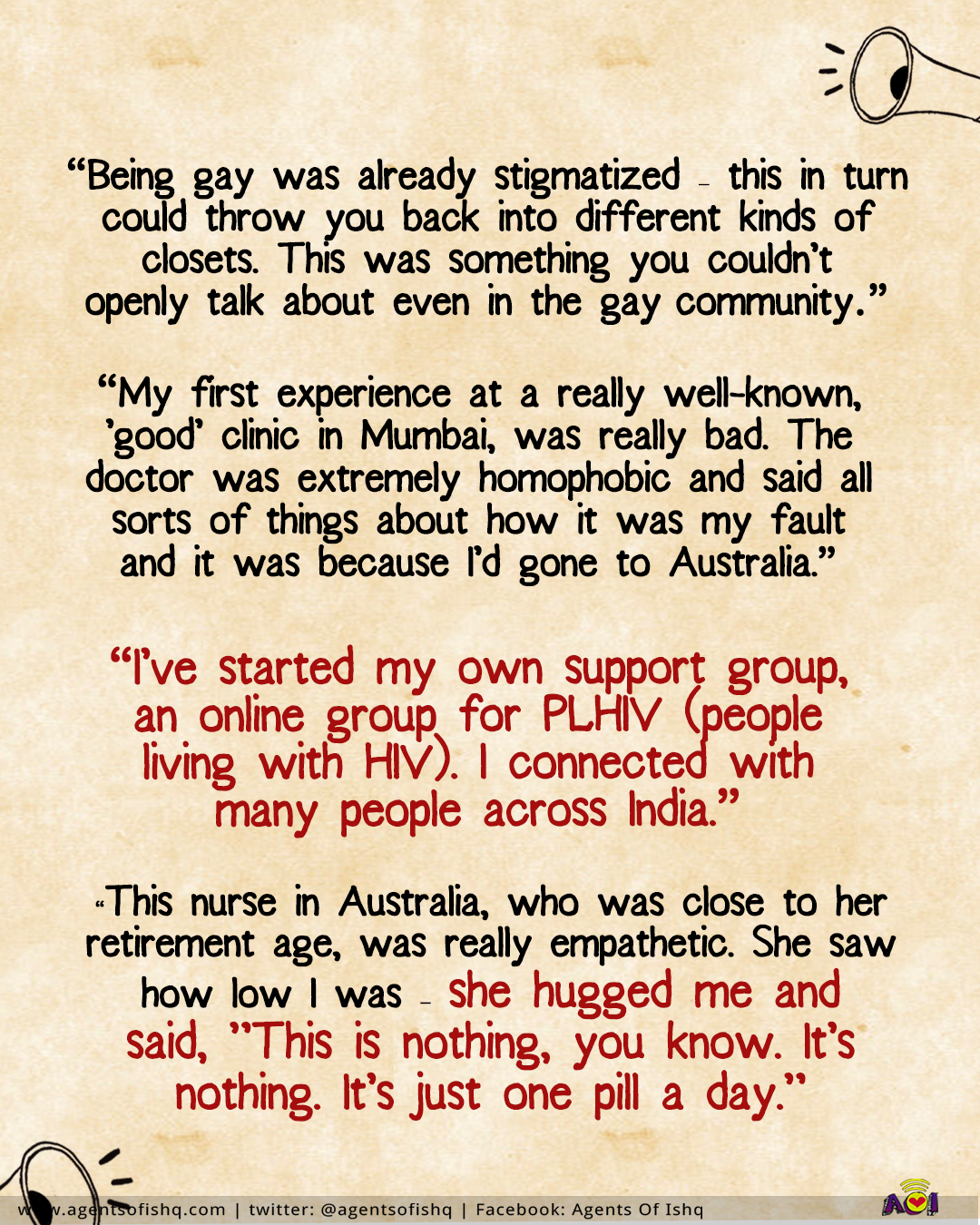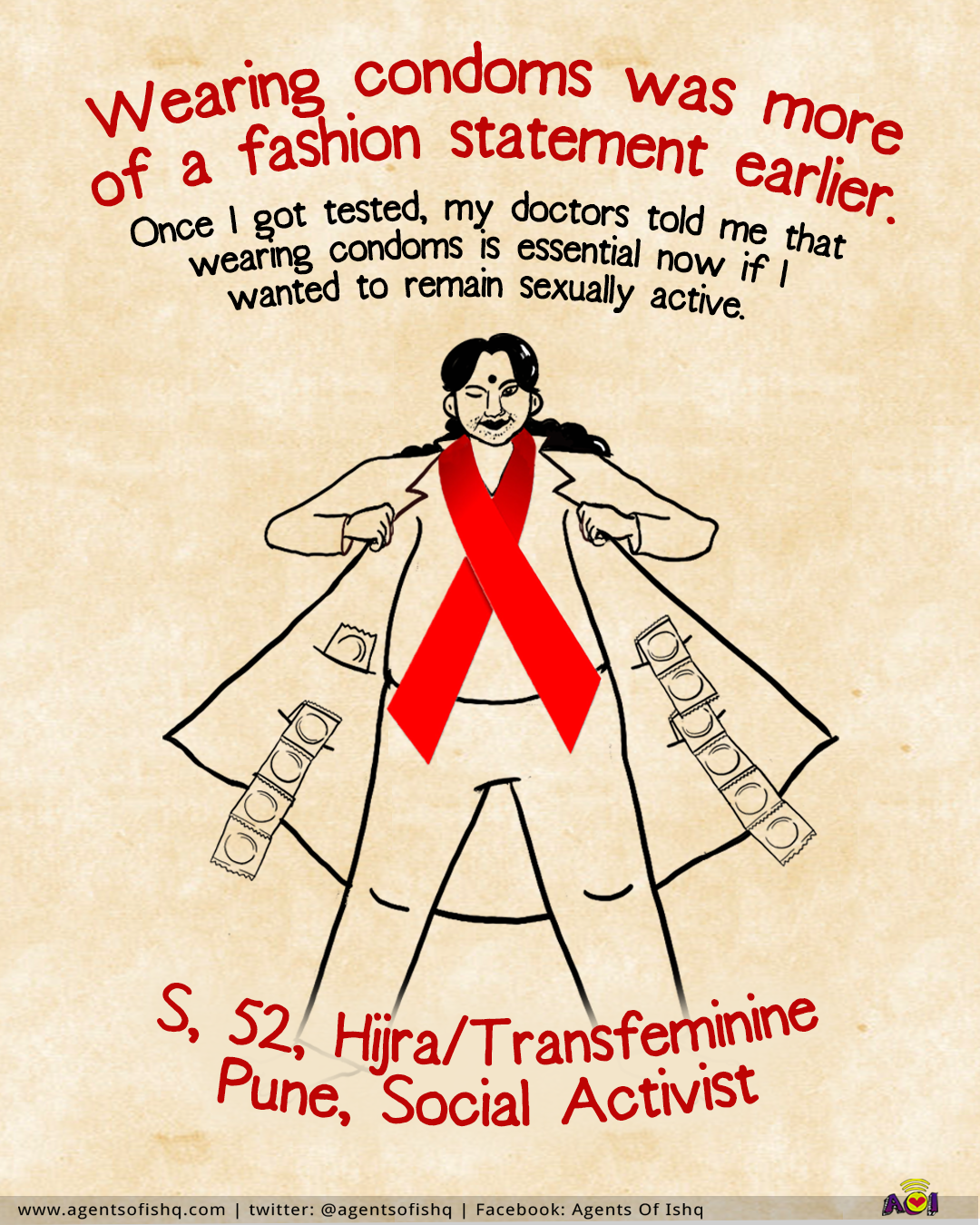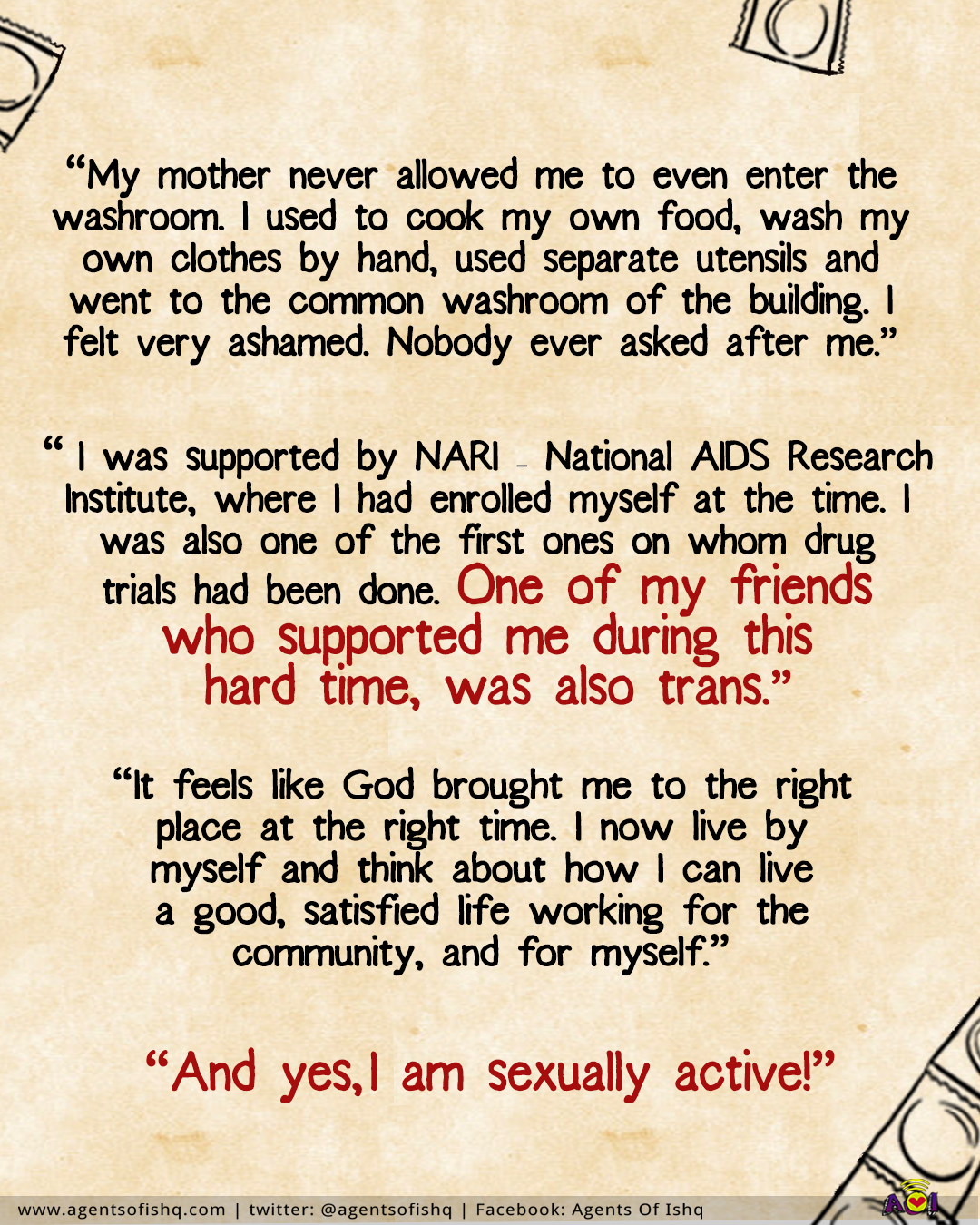“If you can get tested for malaria or dengue, why not HIV?”
When did you find out that you had HIV?
I was put to work in 2000. At that time we didn’t know what HIV was or what precautions one could take, or even about condoms.
For two years, I was locked inside a house, only given food and clothing. There was no sense of morning or night. After two years when the “malkin” of the house said my debt had been cleared, I was let go.
Then in 2002 I got pregnant and was taken to the doctors and in 2003 I had a cesarean delivery. I was not allowed to give my child breast milk, but there was no mention of HIV then.
In 2007 I was diagnosed with TB in the lymph nodes and was given injections and medicines. At that time, I was also told that I was HIV+. The people at the Saheli office said I had to have medicine.
So, I continued the TB and HIV medicines. But, in 2008 when I stopped the TB medicines, I stopped the HIV medicines too! I was fed up with having medicines. And initially I suffered a lot of side-effects with the medicines too, sleepiness, nausea, and vomiting. For three months nothing happened. After the fourth month, I started getting fever, cold, and body ache.
Then, I was taken to the doctors and this time I was told that I can’t stop having the medicines ever, as long as I lived.
My medicines would be monitored every 15 days.
My child died in 2010 suddenly. The medical centre didn’t give an explanation.
Around 15 years ago, I adopted two kids after giving money. The kids had been abandoned by their mother and sold to the brothel. I had wanted children and I knew that I had HIV so I couldn’t give birth. So I decided to adopt them.
The boy is negative, but the girl is positive. I was told not to adopt her, to give her to a sanstha. But if the world can accept me as HIV+, why can’t I accept her?
Then in 2014, I got pregnant again. I didn’t want to deliver the child, but by the time I made the decision and went to get an abortion done, it was late. I could lie to the doctors about the time of the pregnancy, but the sonography doesn’t lie.
Then I was told that it’s not always necessary that the child of a positive mother would have HIV. If I had my medicines on time, it would be possible that my child wouldn’t be affected.
And that was the case, I gave birth to a boy and he tested negative.
I had to take care not to breastfeed him, but he is healthy otherwise.
How is your daughter now? Does she know what being HIV+ means?
She is on medication now. I had to tell her at some point, because he would hide her medicines. Then, when she was in Class 7, I sat her down and explained to her that this is a difficult disease and lifelong and that it’s important to have medicines daily. Her friends don’t know, and they don’t need to either.
I take the boys for testing regularly too and so had to tell them. It is possible for the infection to show up in the body years later, so we get them tested at least once a year.
I have also warned all my children not to take any injections or medicines that they give at school and that if the teachers insist, they should ask that they call me first. You have to be careful.
Have you told your clients about your positive status?
I haven’t told anyone that I am positive. Many clients are not married or may have kids. I tell them to get themselves tested. Also, one person doesn’t just come to one person regularly. If some day I am not available, they may go to someone else.
I tell them to get themselves tested, just like one would get themselves tested for malaria, or dengue. It’s free in government hospitals.
What do you feel about living with HIV in the long-term?
In so many ways it’s much easier than living with diabetes. When you have diabetes, there are restrictions to what you can eat, wounds don’t heal, there’s swelling in the body, and you still have to take meds every day. With HIV, you can eat what you want, and do anything as you want. Just take medicines on time.
The one thing is that I suffered kidney failure and had to have it removed in 2019. It was because of the prolonged use of the HIV medicine. But now I am feeling perfectly fine with one kidney. I leave for work at 9 pm, come home by 5 am. After that I cook for my children, send them to school and go to sleep. Then I wake up, do my household chores, have my medicines, have lunch with my kids when they get back home and make dinner for them.
S, 36, Female
Pune, Sex worker
__
‘I cannot spread the infection, even with non-protected intercourse’
When did you get tested for HIV?
Being a gay person, I was aware that I have multiple partners and we are encouraged to get tested every three months.
Coincidentally, during the Dec-Jan-Feb period in 2013, I had gone to Humsafar Trust to donate laddoos. I thought randomly, ‘let me get tested’. I was confident that I wouldn’t have HIV. I had no symptoms.
But a counsellor called me and asked me multiple questions and I realised that my report said that I was reactive. It was heartbreaking. I took the report and headed home.
I had a neighbour who is a medical professional and I told her that I had tested positive. She was the first person I had come out to. She said that we need to immediately start treatment.
She was a support system. I think she was also a little upset with me because she had told me many times to be careful.
That night I had to leave for Gujarat for a legal hearing related to my father’s death. I was unable to stop crying.
I had tested positive at a very early stage. Initially my viral load was high, but within six months or a year, the viral load – how much virus there is in the body – came down to undetectable. This also means that I cannot transmit HIV to anyone. Even with non-protected intercourse. This is called “u=u”, i.e. Undetectable = Untransmittable.
Did you have any partners at that time?
I did. This person I was dating then, was a professor at a college in Mumbai. I called him and said I had tested +ve, and that since we have been in sexual contact, he should check his status too. But he wasn’t ready to do it then. He eventually did get tested a few months later. I connected him to a doctor and that’s how that chapter ended.
What were your fears initially after diagnosis?
I guess my first thought was that my dating life was over. Even if I find someone and meet that person and stay in a relationship with them for six months, when they find out my status, they would break up with me.
Even within LGBTQ community, there is education about HIV, but no one wants partners who are HIV+ve.
I was also afraid that all my professional dreams would be shattered. I had wanted to migrate to Canada as a child, do a PhD there. But Canada has restrictions against people living with HIV and I realised that that dream had shattered. Later the rules changed somewhat, I had tried to move again in 2019, but the pandemic made that impossible.
What is the one thing that you have learnt about living with HIV that has surprised you?
People say that the stigma and discrimination has gone, but that’s all bullshit. Not everyone is aware and educated enough or treat people with HIV well.
I don’t get health insurance. I am ready to pay and want to secure my health, but no provider is easily available. Many community members have insurance, but when treatment starts, hospital mention HIV status only to have the provider reject the mediclaim.
I have friends who live in different parts of India, who suffer because have to go to government centres, and not all can afford private medicines. And in govt centres, LGBTQ people are treated as criminals.
If my family finds out, they may throw me out of the house, not give me my economical rights. There’s no saying how people will react.
How was life during the COVID pandemic?
It’s always in the back of your mind that it’s easy for us to get infected, but having nutritious food, taking care of your body and mental health, goes a long way in being healthy.
I was working with social sector organisation and now, as well. Being in the social sector we were doing frontline work of distributing PPTs, Masks, nutritional help, etc.. My organisation knows my status. I had shared this while joining in case I ever needed long leave for health issues (fortunately I haven’t had to).
I was happy to do frontline work. I did get COVID in all three phases, like many people did.
But I also recovered.
I was affected in all three waves of the COVID-19 pandemic. I suffered a burnout I think and was depressed and almost not interested in working.
Pre-COVID life had changed a lot. I had been trying to shift to Canada, but because of the pandemic that ended. In 2020, I also broke up with my partner of 5 years.
How did you meet him?
We were in the same support group, i.e. his status is positive too.
Are you on dating apps now?
Yes.
Do you tell them if you are positive? What happens then?
Most cases that happen, people talk nicely when you share that you are positive, but then say that they want to stay friends only. Don’t want to continue after that.
Had you been in their shoes, would you have felt some hesitation too?
Everyone wants to safeguard themselves, they don’t understand this. Much before I tested positive, I was dating someone for a while. After three months he said he was +ve. I reacted by crying and broke up with him. We hadn’t had intercourse. At that time I was not aware of what HIV really is and that one can live with it and also not spread it to their partner.
I told him I can’t love him any more. Then after that I stopped talking to him.
And then, when I tested positive, I stood below his building, met him and apologised. I supported him when he was hospitalised and suffering from medical conditions. Stayed with him in the hospital and supported him whenever he needed it.
What has surprised you about Living with HIV?
When I was diagnosed I thought I would start suffering medical issues very early. But till now, nothing has happened and I am completely fine. I have a good moral support system, you need will power to get through this, and reach out to support groups. We have some, but not as much as the west.
We need to remove the stigma around HIV. It’s nothing. Get tested. And if you test positive, get treatment as early as possible.
S, 35, Male
Mumbai, CSR Official
___________________________
"Testing positive for HIV helped me to do something for others and become an activist"
What made you test for HIV?
When I shifted to Australia I started testing on a regular basis, every three months. In May 2018, which was two days before my birthday, I received positive results on the test.
What did you first feel when you found out, especially considering you tested routinely?
After losing Dad, I went a little unhinged. I wasn’t able to process the grief and went on a spree of having mindless sex. I wasn’t even thinking about protection. So, I went and got tested as per usual, the results usually come after a couple of days. If something is wrong, they call and ask you to meet the doctor. So once I got the call, I was preparing myself for it the entire day.
The next day I got to know and I was completely numb. Also, the first loss was already there and then this news. It was quite shocking. At that time, I just wanted to get lost again, run away from reality. So again, I threw myself into drugs and drinking. Looking back, I feel like I could have easily become a drug addict.
But I lost all emotion. I didn't allow myself to feel anything at that point.
What did you do once you found out?
After that, as I said, I stopped thinking, I didn’t want anything to do with what was going on around me, I just wanted to get lost. That was my reaction at the time.
Did you try to reach out to your current or previous partners in an effort to trace how this happened?
I can’t press too much on what happened because I was pretty much having mindless sex. But then I did reach out to someone, after a while, I wasn’t meeting a lot of people, it was just one person. So the first thing I did was to contact him and ask him to get tested, but luckily he tested negative.
What was your relationship with your body, and just with having sex and your sexuality before your diagnosis or even before the passing of your father?
Earlier, I was more mindful about who I’m meeting, using protection and getting tested. Afterwards, I kind of stopped caring. But I don’t think it had anything really to do with my HIV diagnosis.
My relationship with my body and towards sex and dating changed more after I moved to Australia. Growing up in a very orthodox Marathi family, nobody was really talking about being gay. Moving to a society which was accepting, helped me accept myself for I am. And suddenly going to Australia, being in the society and accepting myself for who I am. So that kind of changed, but that has nothing to do with even before and after the HIV virus.
At what point were you able to kind of reach through the numbness for help and were there any resources available at the time which helped you make sense of what you were going through?
Yeah so Australia in that sense is very progressive. There is awareness about HIV. There is a lot of stigma here, but over there it’s very normalized. So once I got diagnosed, they had services through which I could access free medication and counselling.
One of the major turning points in my journey with HIV was this nurse in Australia, an old nurse close to her retirement age. I distinctly remember her face as well. So after about two-three months of detection, when I finally went for my checkup and medication, she was really empathetic.
She saw how low I was – she hugged me and said, “This is nothing, you know. It’s nothing. It’s just one pill a day, there’s worse things out there.” At that point, I got the chance to let loose and let every emotion that I was feeling stream out.
After that, I took professional help. And I said, like, you know, before that, I was heavily using drugs or drinking and all those things. But after that particular incident, I started my counseling. I think that it helped for the both, like, you know, for coming to terms with HIV and also the preceding trauma. So that helped a lot.
And were you able to share this with anybody? Were you able to find a community?
From there, I came back to India because of COVID – and one of the first questions I had was about how I’d manage my medications here, and even the ART centres. My first experience here, which was actually at a really well-known, ‘good’ clinic in Mumbai, was really bad. The doctor was extremely homophobic and said all sorts of things about how it was my fault and it was because I’d gone to Australia.
Luckily, because I’d lived in Australia, I had some awareness before coming here. I was able to take a stand for myself. I also knew people in the community, who in turn knew other people – and could emphasize the fact that I would take action if he discriminated again. But I was one of a few, privileged people.
This incident also motivated me to start working for the community, for people who have HIV.
Right. If somebody experiences this right after being diagnosed, it could traumatize them even more.
Yes, pretty much. Being gay was already stigmatized – this in turn could throw you back into different kinds of closets. This was something you couldn’t openly talk about even in the gay community.
So there's this group called Impulse Mumbai, which Sumit [Pawar of QKnit] started along with a few others. I joined that group. I was very vocal about my motive which was to create awareness, bring positivity and also bring about a change.
That was back in 2022. Since then, I’ve started my own support group, an online group for PLHIV (people living with HIV). I connected with many people across India. The problem is that people don't have the adequate knowledge or resources where they can reach out and get the exact information. I was fortunate enough to be in Australia and I also read up a lot on HIV, being the nerd that I am.
But often, even people living with HIV don’t have much knowledge about things you should be aware about. There is a lot of miscommunication and circulation of misinformation. That’s what solidified my motive to be there, to say, ‘If they have any questions, I’m here to answer.’
And if I’m not able to answer, I will directly connect them to doctors and counsellors.
Yeah, if you don't have people to lean on for support or if you don't have resources that give out the right information, then it’s likely that you will internalize what society is giving out as misconceptions or myths and that might make you feel even more alienated from yourself.
Absolutely.
And do you think you found any such support groups when you first got diagnosed in Australia or even international groups?
I actually did. As I said, Australia was very open about HIV. They have a solid understanding, whether it’s undetectable, whether it has symptoms – there is a lot of awareness in the community.
Or even on social media and Grindr. Which is lacking in India, here even in the medical fraternity is not quite aware about what exactly it means to treat PLHIV.
I was a bit lucky to have found a community over there and the support that I needed which helped me to accept it as just another medical condition and not something that defines me.
When you first started your treatment, were there any changes that you noticed either physically in terms of hormones or energy levels or were there any emotional changes?
Absolutely nothing. So if we’re talking about 30 years ago, HIV was like a death sentence. But the medication now has changed so much, it has advanced so much that there is minimal strain.
So you're able to continue your life as normal?
Absolutely normal. I'm an athlete. I’m able to play badminton and tennis for 2-3 hours at a stretch. I feel like sometimes I have more energy than other people around me. One thing I always tell people who connect with me and are really depressed is that with HIV, it’s just one pill that you have to take everyday – and that’s about it. That’s exactly where it stops.
If I have to give you a comparison, if you have a blood pressure or blood sugar, you have restrictions. You have strict rules that you have to adhere to. You have to eat something, not eat something, you have to walk, you have to sleep, you know, so many things that you have to take care of.
So I’m not undermining the seriousness or severity of HIV. But there’s absolutely no restrictions – you can drink, smoke, do whatever you want.
So, the stigma around it has really been blown up for no reason at all.
The reason is actually pretty simple, it’s because HIV is still thought of as a gay disease. And then the fact that it’s a sexually transmitted disease. And here in India, we don’t talk about sex or STIs – or more than being specific to HIV, I think it’s more about the fact that it’s an STI. Because practically speaking, it’s less severe than something like blood pressure if you diagnose it and take your medication properly. It doesn’t turn into AIDS unless and until you avoid taking medication for a long time after you’re infected.
Have you met new people since your diagnosis? Are you on dating apps? Has your diagnosis changed what intimacy looks like for you?
So, I’ll give you two scenarios. I didn’t let it change, because I was aware about the condition, and I didn’t really let it become anything more than what it is. Even today, I’m pretty vocal about it, and even today my Bumble profile says that I’m a PLHIV. That discussion stops right there for me.
If you don’t know about it, read up about it, educate yourself about it. So if you ask me, I’ll definitely help you navigate through it, but that’s not my job – again, the discussion stops right there.
If you guys work out, or don’t, that depends on a lot of other factors – but this never comes into the picture.
So I’ve been pretty lucky in the people I’ve met as well. I’ve gone out with a lot of people. There’s obviously a lot of people who had some issues, and we never connected – and I never bothered pursuing them either. And a lot of people who’ve connected with me and stayed by my side as well.
Yeah. But the flip side to it, because I've talked to a lot of people, I've seen so many people, even doctors and counsellors who have worked very closely with people who have tested positive for HIV – but don’t want to date a PLHIV to avoid any complications.
So I’m of a different opinion. If I meet someone who happens to be a PLHIV, then it’s fine. But I don’t actively go looking for them. It will never happen in my case.
But a lot of people are doing the other way around. They are reducing others' identity or themselves, their status of HIV. And that is where my awareness or, what I can say, the activism starts over there for me.
To make them understand that you are more than your status, you are more than what you think of yourself. And there's nothing less about you. It just happened.
Right. It's just one part of you.
Yeah. Exactly. And so if you give the power to someone to put you back into the closet because of your status, you're again doing the same thing when you discover your sexuality.
The first and most important thing is that you have to make yourself aware about what it is, and what it is not. Get your facts right. Once you have those, you get the confidence to accept yourself.
In that way, it’s similar. The same analogy works – whether it’s your sexuality, or your medical condition.
What has surprised you about living with HIV both in good and bad ways, if there are any?
So the first thing which happened to me which was good – was that nothing changed. And that surprised me. More than anything it just made me more aware about who I am. It pushed me to a point where I started doing something for others rather than just keeping it to myself.
Kind of led you to your activism days.
And the surprise in a bad way is, I'm surprised at the level of unawareness that can be in society about HIV, not just the common people but within the medical fraternity as well.
I say from my own personal experience when I went to a hospital in India, I told them that I am HIV positive, just treat the situation yourself. I don't want my family to know.
And when the shifts were changing they were openly discussing my status.
The flip part to this as well – people are not aware that there is a law that protects them and their status right. When people get something, they don’t really educate themselves. There is an apathy to learning something.
A, 32, Male
Mumbai, Social Activist
___
“I’m still sexually active, I engage in oral sex now. I’m proud to say my viral load is now undetectable”
Where are you from? How old are you? And what do you do?
I’m 52 years old and I’m from Pune. I grew up here and also pursued my education here. I’m a mechanical engineer. I belonged to a well-educated family. Since I was young, I was always amongst girls, and I feel myself to be feminine. The only difference is that I don’t wear women’s clothes – I wear men’s clothes. I work in an NGO now, which also happened by chance, actually. In 1994, I realized I’m HIV positive.
How did you feel when you found out? Did you do anything or tell anyone?
I felt very disturbed mentally. In distress, I took nearly 80 headache pills, and even tried to die by suicide two times by jumping into a canal (but it had no water) – I failed at both attempts. I felt ‘zasa zagna aaplya haataat nahiye, tasa marna hi haatat nahiye.’ (Just as living seems out of my hands, dying seems to be out of my control too). I found out also by accident – I’d gone to donate blood in a camp because my friend’s son was in need. I met very good doctors there. When they were running tests for HIV, malaria and checking my history, the doctor told me that I’m testing positive for HIV.
I wasn’t working at the time so I was very stressed about how and where to get the money from. I slipped into a lot of addiction – I started drinking, smoking and eating paan and gutka (manikchand).
I had a friend who was also a hijra and working with an NGO – I first opened up to him about having AIDS. This was back in the ‘90s or perhaps around 2000. By that time, I was also on the hunt for information – I was reading articles in newspapers, monthly magazines (maasik). He introduced me to the field of NGOs, and asked me if I would like to work in the social service sector – and specially introduced me to Budhwar Peth (a neighbourhood in the interior parts of Pune).
I knew of the hijra and female sex work gallis in Budhawar Peth, but had always been hesitant to go there. My friend said that perhaps I could focus my work in this area of the city. I came from a well-educated family, I didn’t want to wear a sari and do sex work, or beg on the streets to earn my livelihood.
Thus began my journey of working with NGOs. I’ve worked with many organizations over the years – I worked with Samabhabona, then Saheli Sangya, then a project that focussed only on people who were HIV positive in slum areas. By this point, I began to feel some surety and assurance in myself that I can work in this field. 2012 onwards for a bad period and I thought I truly would have to beg on the streets. Luckily, I found a missionary trust who supported me – but their fund too shut down during the pandemic.
Then a new foundation called Swarnakuti opened in Budhwar Peth. Now, it’s been 2 years since I’ve been working here. We speak and work with transgender people, female sex workers, people who are HIV positive and single women and train them in skill development. We train women who live in these slums and other women in different skills like makeup, cooking, mehendi etc. to help them become financially independent.
What was your sex/dating life like as a young person? Before you got diagnosed?
I found out I was HIV positive when I was about 22 years old. I was a pretty sexually active person. A lot of factors contributed to this including the rush of hormones and feelings that comes with being young. There was absolutely no awareness at the time regarding protection.
Right, now you’re part of an organization that helps other young people and also guides them towards resources – but things must have been different back then.
Absolutely! There was nothing back then, no information and no people who would guide you in the right directions. People wouldn’t even say HIV back then, it was just AIDS. Information around this was also always shrouded in this atmosphere of strangeness and fear – around death, and the hazards of the disease.
I expected some support from people at the time, but nobody ever stood by my side. My family found out only after 5-6 years after my diagnosis. My father never spoke to me, my mother was well-educated – she felt a lot of pain after I was infected. She said that she could accept that I was a hijra but she couldn’t come to terms with this. I lived in Sadashiv Peth (a very typical Marathi, Puneri orthodox and conservative part of the city) – and they wanted me to leave the house. But something roared from within, and my inner Sameer awakened at the time. I refused to leave the house – what other options did I have? I was very restless, and depressed, and even tried to die by suicide as I mentioned earlier. My mother never allowed me to even enter the washroom. I used to cook my own food, wash my own clothes by hand, used separate utensils and went to the common washroom of the building. I felt very ashamed. Nobody ever asked after me. I felt as if I was an adopted dog – left to its devices when it comes to survival.
In 2006, after I started ART, my liver swelled as a side effect. My urine was bloody, my stools were whitish, the doctors didn’t know whether I would survive. I was admitted to Sanjeevan Hospital. I was supported by NARI – National AIDS Research Institute, where I had enrolled myself at the time. I was also one of the first ones on whom drug trials had been done. One of my friends supported me during this hard time who was also trans.
I used to say that I’m Dr. Vinay Kulkarni’s patient who used to specialize in folks who have HIV. I faced a lot of discrimination at the hospital – I was admitted for eight days, but nobody came to check on me or even change my sheets or straighten out the blankets. My father never visited, my brother visited once and my mother used to come visit with a lunchbox everyday just out of courtesy. In the midst of all this, I caught tuberculosis and herpes as well – I am alive today only because of the good doctors I found there and NARI.
NARI helped me with my medication and counselling, all for free.
So have medications changed now? Are there lesser side effects with medicines that are commonly and easily available to the public today?
Yes, definitely. At that time, medicines were either not readily available or extremely expensive – ranging up to Rs. 10,000. Later, the government issued more medicines, but even those were available in just one or two places in the city. NARI supported me a lot. Earlier, I used to take three medicines at three different times in the day – and one of them made me feel as drugged as though I had drunk an entire bottle of alcohol.
Now, my medicines have completely changed in the last couple of years. I take only one pill now, and they have no side effects. I would say taking medicines on time, listening to your counsellor, immersing yourself in work and staying positive are the only things you can do. I feel happy to say that in the last many years that I’ve been on medication for, I’ve only missed taking my pills 5-6 times.
How has your sex/dating life changed after your diagnosis?
Wearing condoms was more of a fashion statement earlier. Once I got tested, my doctors told me that wearing condoms is essential now if I wanted to remain sexually active. (jokingly they add) My doctor said that it would be good even if you don’t have a sex life, considering you’ve done a lot of mauj-masti in your younger days, but we won’t put any restrictions on you.
I’m still sexually active, but now I only engage in oral sex, I don’t do anal sex like I used to earlier. Even if they ask, I don’t engage in it. I feel proud in admitting that my viral load is undetectable now.
Do you keep testing to ensure that your viral load remains undetectable?
Yes, we usually test for viral load about once a year. And all of this is also free of cost, sponsored by NARI, which in turn is a government initiative. The staff and the doctors are absolutely fantastic – they even urge trans people to not wait in line, but go in ahead directly. Especially because our community is prone to making excuses like ‘we don’t get medicines,’ or that ‘it’s too crowded,’ – saying this, they never visit a clinic or doctor. So now the government has made these initiatives to encourage people to go to the doctor. Missing medicines is also hazardous. Many people go off medication for 2-3 months and their viral load keeps increasing, or they even forget their medication. So the point of the initiatives is that people go and so that HIV is not transmitted further.
Your work is truly making a difference to a lot of people, especially things you might have wished that you had access to growing up.
It feels like God brought me to the right place at the right time. I now live alone and think about how I can live a good, satisfied life working for the community, and for myself.
S, 52, Hijra/Transfeminine
Pune, Social Activist
________
‘One day, someone found out that I was +ve and she wouldn’t even sit next to me. That hurt a lot’
Could you share a little bit yourself?
I am from Nepal. First I had come to Bombay and then shifted to Mumbai. I am over 40 years old and have been living here for over 10-12 years.
When did you get tested and why?
It’s been three years. I was unwell. I used to fall ill regularly, get irritated, not feel okay. I went to get my uterus checked, because I wanted a child. First they said all was well. Then a year later, I went and they said my uterus would have to be removed, else I may get cancer. But before the operation, they said I am also HIV+.
What did you feel when you found out that you were positive?
There was no one to talk to at that time. I was scared. I wondered what would happen if people found out? I felt bad and wondered what I had done wrong that I was suffering like this? And had to have medicine?
Do you have someone you speak to about this?
My family back home doesn’t know. There are a few friends who do and they understand, but not everyone. There are one or two people I can talk to, and when I talk to them I feel at peace.
How do you take care of your health?
I am careful not to break the routine, not eat too much outside food, only home-cooked meals.
So you don’t eat outside food at all?
No, we go once a month. I like bhel puri, pizza.
Do you go alone to the hospital?
If a friend can come along, I take them, else I will go alone.
If you meet someone who has just tested positive, what would you share with them?
I’d say look at me, I am living and we can also live happily with everyone. Don’t stress about this, we can live another 100 years. If you trust someone, share with them.
Don’t think your life has been spoiled.
Did anyone ever react badly on knowing that you are HIV +ve?
In the house where we live there are many women. We live together, eat from the same thali and share. One day, someone told a girl that I was +ve and she stayed away from me, wouldn’t even sit next to me.
Did you talk to her?
No. I felt so hurt. I stopped talking. Now she has moved away.
S, Female, 40, Pune
Sex worker
Special thanks to Saheli Sangh, Pune and QKnit Foundation.



